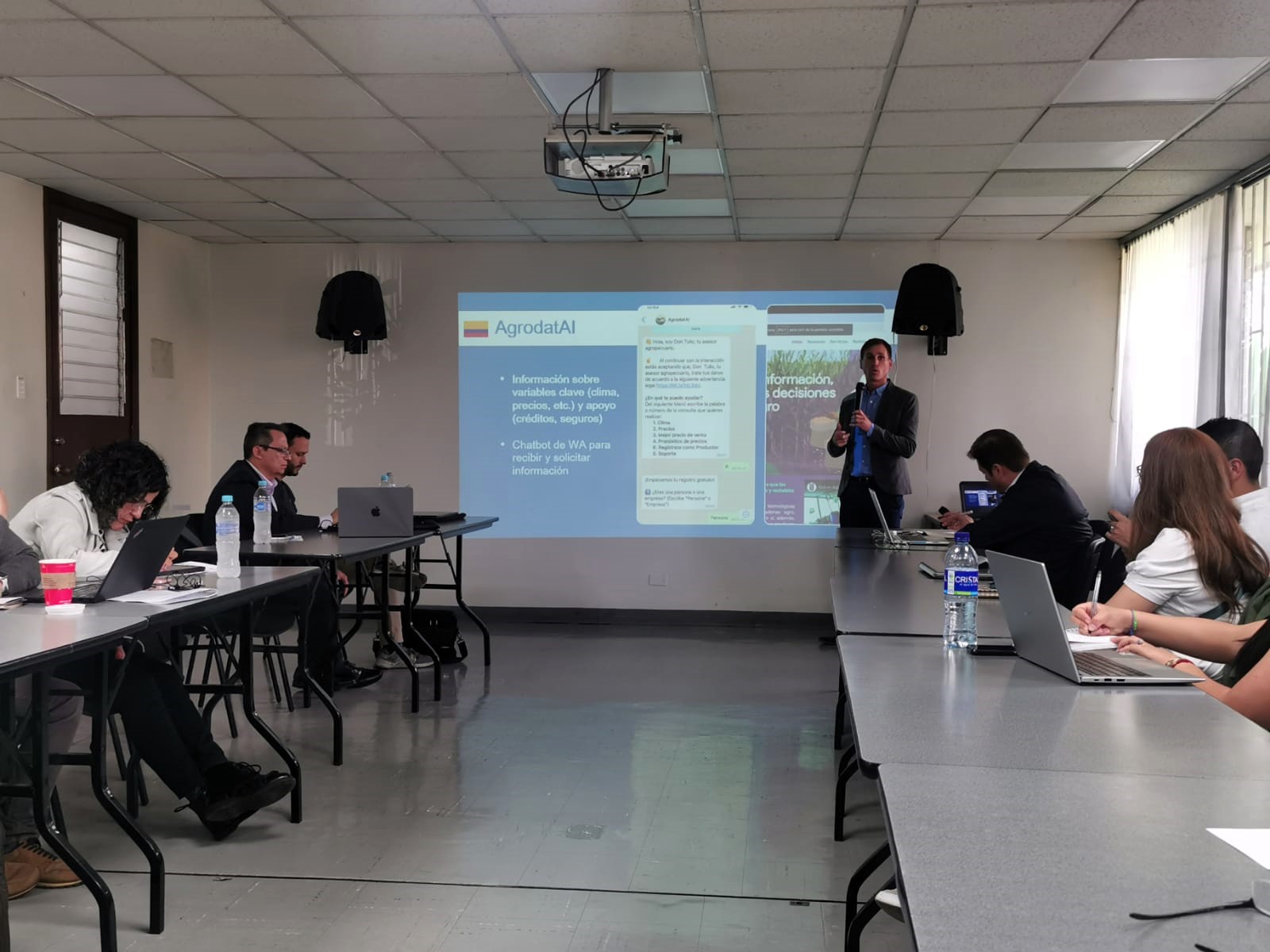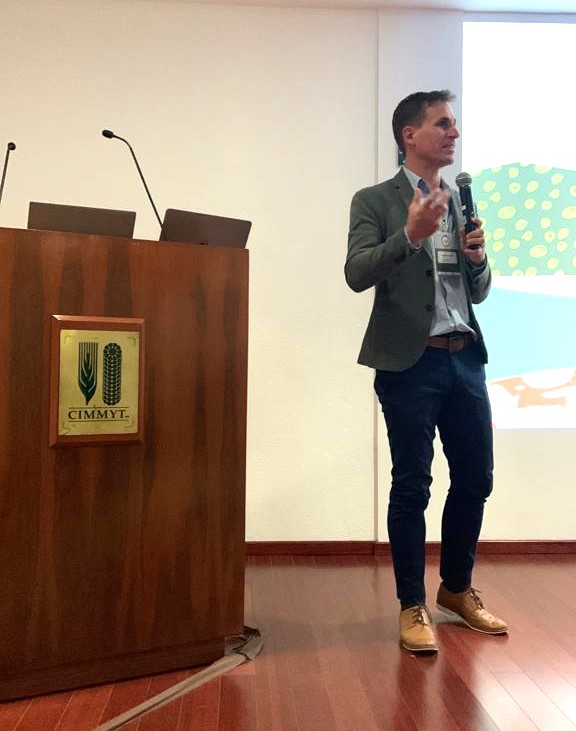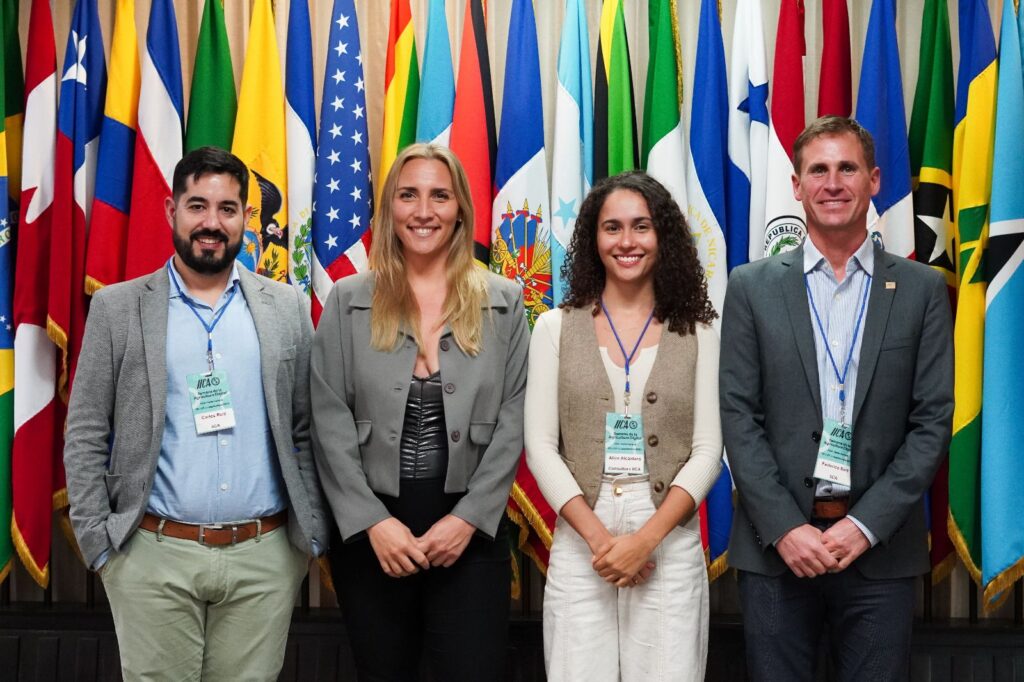La introducción de tecnologías digitales es, sin dudas, un proceso necesario para contribuir a la transformación de sistemas agroalimentarios, tornándolos más sostenibles y resilientes frente al cambio climático, ya que permiten un uso sustancialmente más eficiente de insumos externos y recursos naturales, contribuyendo a disminuir impactos en el ambiente.

San José, 24 de noviembre de 2023 (IICA) – La digitalización gana cada vez más impulso en la agenda agropecuaria de las Américas, con nuevas actividades en Colombia y México del programa de Digitalización Agroalimentaria del Instituto Interamericano de Cooperación para la Agricultura (IICA), que aporta su acervo técnico y una red generada con actores claves del ecosistema digital – en especial agtechs – para promover el aprovechamiento de soluciones digitales y un desarrollo sostenible e inclusivo en la ruralidad.
El programa del IICA, que lidera el especialista Federico Bert, participó en el ICT4AG (https://ictforag.com), principal evento global de agricultura digital, que reúne expertos y entusiastas comprometidos en buscar soluciones para los desafíos de los sistemas agroalimentarios a través de la digitalización. Este año, el evento global fue complementado con capítulos regionales, uno de ellos en Latinoamérica.
El IICA fue co-organizador junto a CGIAR y CIMMYT (Centro Internacional de Mejoramiento de Maíz y Trigo) del capítulo LATAM del evento ICT4AG, realizado de modo presencial en las instalaciones del CIMMYT en México.
El capítulo LATAM reunió a agtechs -en su mayoría integrantes de la red conformada en la Semanas de las Agricultura Digital del IICA 2022 y 2023-, y representantes de institutos públicos de investigación, de fondos de inversión y de corporaciones de la industria agroalimentaria de México y el resto de la región.
Se analizaron los elementos necesarios para una digitalización responsable en los países de América Latina y el Caribe, con el consenso de la necesidad de promover y facilitar el uso de tecnologías digitales ya existentes, que podrían tener grandes impactos positivos en productores muy diversos.
La introducción de tecnologías digitales es, sin dudas, un proceso necesario para contribuir a la transformación de sistemas agroalimentarios, tornándolos más sostenibles y resilientes frente al cambio climático, ya que permiten un uso sustancialmente más eficiente de insumos externos y recursos naturales, contribuyendo a disminuir impactos en el ambiente. Son, de este modo, un instrumento para producir más con menos.
Además, diversos recursos digitales ya disponibles permiten anticipar, monitorear y gestionar eventos climáticos extremos (como, por ejemplo, sequías), contribuyendo directamente a sostener niveles de producción ante escenarios adversos, y con esto a mejorar la seguridad alimentaria y la resiliencia de los agricultores.

Como parte del evento, los participantes trabajaron en una hoja de ruta para desarrollar proyectos de impulso a la digitalización en la región Central, Andina y Sur.
En Colombia, en tanto, las actividades orientadas a promover la digitalización agroalimentaria consistieron en un conversatorio sobre las tecnologías digitales y su impacto en la extensión y asistencia técnica -organizado por la Representación del IICA en Colombia, la red Relaser, la Agencia de Desarrollo Rural de Colombia (ADR) y Agrosavia- y en el lanzamiento de Agro Digital, dentro de la plataforma yaestoyonline, realizado en las oficinas de Google Colombia, iniciativa conjunta entre la Cámara Colombiana de Comercio Electrónico y Google.
En el conversatorio, realizado en la Representación del IICA en Colombia, se presentaron experiencias de uso de tecnologías digitales en procesos de extensión rural y asistencia técnica. Se discutieron con detalles las ventajas del uso de las tecnologías para la extensión y asistencia y se analizaron las barreras que limitan un mayor uso de estas.
Bert presentó algunas de las experiencias analizadas por el IICA en esta área. Mencionó casos de uso de herramientas de comunicación masiva, como WhatsApp, hasta plataformas ofrecidas por agtechs especialmente enfocadas en extensión. Hizo, a su vez, mención especial a los beneficios y limitaciones que puede tener la inteligencia artificial aplicada a estos procesos.
Los expertos del panel coincidieron en la vigencia de los mecanismos de extensión y asistencia tradicionales y la oportunidad que ofrecen las tecnologías digitales de potenciar los mismos.
La iniciativa de la Cámara Colombiana de Comercio Electrónico y Google, a su vez, ofrece una plataforma para facilitar la integración de agricultores colombianos a circuitos digitales, incluyendo no sólo funcionalidades para comercializar, sino también formación de capacidades para promover el uso de la misma.
Durante el lanzamiento se realizaron presentaciones y debates sobre la digitalización en el agro, en especial en lo referido a la comercialización.
En ese contexto, Federico Bert realizó una presentación sobre el avance de la digitalización en la agricultura de las Américas y sus beneficios, enfatizando algunos desafíos que debieran ser considerados para que nadie quede excluido en el proceso.
Más información:
Gerencia de Comunicación Institucional
comunicacion.institucional@iica.int










